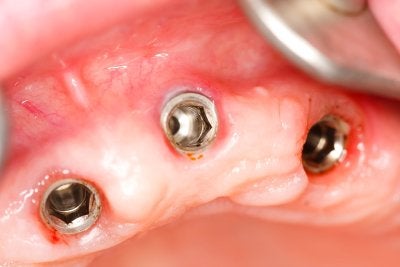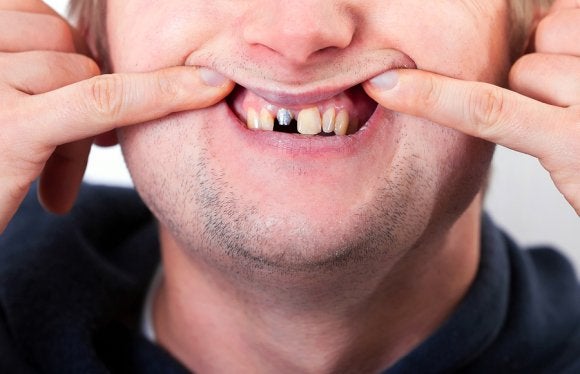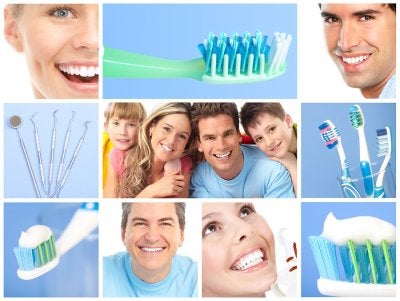-
Are Dental Implants Right for You?
Your dentist may recommend that you get dental implants near Bel Air, MD if you have undergone a tooth extraction, have a severely chipped tooth, or are missing one or more teeth. Dental implants are a safe, effective cosmetic dentistry alternative to dentures and dental bridges. Here is a look at some of the reasons that you may want to discuss dental implants with your dentist.

You are missing one or more teeth.
Your dentist can replace one or more missing teeth via a relatively simple cosmetic dentistry procedure using dental implants. A dental implant is a prosthetic tooth that is attached to a titanium rod that is implanted directly into your jawbone. The prosthetic tooth can be customized to match the size, shape, and color of your remaining natural teeth. This means that it looks almost unnoticeable when you talk and smile.
You are looking for an alternative to dentures or a dental bridge
Dentures and dental bridges are other cosmetic dentistry options that can be used to repair a chipped tooth or replace missing teeth. If you are missing all of your teeth, your dentist will recommend that you receive dentures. However, if you are only missing one or two teeth, dental implants are a better cosmetic dentistry solution. Because dental implants are anchored to the jawbone, they prevent many dental problems associated with missing teeth. Dental implants will ensure that you don’t suffer from jawbone loss, shifting teeth, or facial deformity. Dentures are not anchored to the jawbone, and thus do not prevent these problems.
You are in good physical health and committed to future dental care.
Your dentist will determine if you are a good candidate for dental implants. To be a good candidate, you must be committed to maintaining your future dental care. You will need to brush, floss, and use mouthwash at home. You must also visit your dental clinic at least every six months for dental cleanings and exams. You may not be a good candidate for dental implants if you have severe bone loss or advanced gum disease, smoke regularly, or have certain existing medical conditions.
-
The Uses of Dental Crowns
Do you need dental crowns in Bel Air, MD ? Dental crowns help restore teeth that cannot undergo other common forms of dental work, such as fillings. Crowns act as a protective layer around the tooth, strengthening its structure and upholding its original form. There are several different types of crowns available, including those made from a tooth-colored porcelain material. Talk to your dentist about getting a customized porcelain crown made for your tooth if you dislike the look of gold crowns.
Your dentist may recommend that you get a dental crown for several reasons. Typically, dental crowns are recommended for those who have a decayed tooth with fragmented or large fillings. Dental crowns are also used on teeth that have root canals. Finally, customized porcelain dental crowns may be used for cosmetic purposes.
The procedure for getting a dental crown will usually involve two appointments at a dental clinic. The first appointment centers around making accurate impressions of your tooth in order to create a custom crown that will fit perfectly over it. At your second appointment, your dentist will mount the permanent crown onto your tooth.

-
Choosing a Mouth-Healthy Diet
One of the most important things you can do to maintain proper dental care in Bel Air, MD is to eat nutritious foods that improve your oral health rather than detract from it. Your dentist has probably stressed the importance of maintaining a proper oral hygiene routine to avoid tooth decay and the need for tooth extraction. Your meal and snack choices are just as important as brushing and flossing when it comes to maintaining oral health. Keep reading to learn more about choosing foods that are healthy for your whole body—including your teeth.

The Relationship between Sugar and Tooth Decay
Tooth decay occurs when the plaque that builds up around your teeth and mouth comes into contact with sugar from the foods that you eat. This interaction can cause acid to eat away at the teeth, forming harmful cavities. Eating a non-nutritious diet high in sugary foods can even affect your immune system, making it more difficult for your body to fight off infection and leading to oral health conditions such as gingivitis, advanced periodontal disease, and eventual tooth loss. Fortunately, tooth decay is preventable. In addition to a good dental care regimen including brushing your teeth with a fluoride toothpaste twice daily, flossing every day, and making regular visits to a dentist, you should eat a healthy diet and avoid added sugars in order to help keep your teeth and gums clean and healthy.
How to Choose Nutritious Foods
In order to choose nutritious foods for a healthy diet, be sure to read the nutrition facts and ingredients list for all processed foods that you purchase. This will help you avoid choosing products that are high in hidden sugars and that may not provide you with many vitamins or minerals. The most obvious culprits are candy, cookies, and pastries. Don’t forget to take into account what you drink as well. Soft drinks and juices typically contain an abundance of added sugar, and even some dairy products contain sugars that can cause tooth decay if they are consumed too often.
-
Proper Flossing Technique
Do you practice proper dental care in Bel Air, MD? Your dentist has probably told you that one of the most important parts of a healthy dental care routine is flossing daily. Be sure to use a proper flossing technique in order to avoid dangerous tooth decay.
Watch this video to learn the details about proper flossing technique. Wrap about 18 inches of floss between your two middle fingers. Then, gently insert the floss between your teeth, working it up and down against the surface of each tooth. Don’t forget to floss behind your back teeth, too! Ask your dentist or local dental clinic if you have any questions about flossing when you have dental work such as a dental bridge or orthodontic appliances.
RECENT POSTS
categories
- Uncategorized
- General Dentistry
- Toothache
- Emergency Dentistry
- Family Dentistry
- Receding Gums
- Cosmetic Dentistry
- Veneers
- Gum Disease
- Gingivitis
- Dental Crowns
- Orthodontics
- Dental Implants
- Root Canal
- Wisdom Teeth
- Teeth Whitening
- Your Smile
- Composite Fillings
- Lumineers
- Dentures
- Invisalign
- BrightSmile
- Dental Bridge
- Abscessed Tooth
- Sealants
